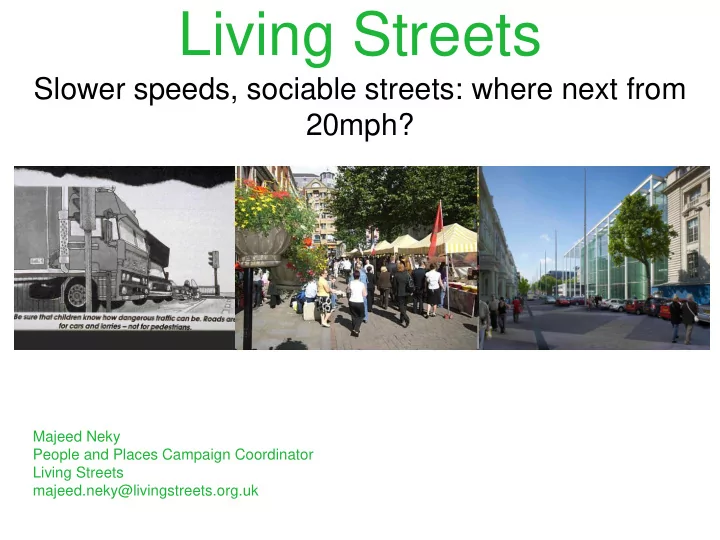

Living Streets Slower speeds, sociable streets: where next from 20mph? Majeed Neky People and Places Campaign Coordinator Living Streets majeed.neky@livingstreets.org.uk
Living Streets Living Streets is the national charity that stands up for pedestrians. With our supporters we work to create safe, attractive and enjoyable streets, where people want to walk.
Influencing policy at a national, regional and local level
Delivering projects and campaigns
Supporting local delivery Local Groups Conferences & Training Consultancy Services
New challenges and opportunities – Central government: anti-regulatory environment - new guidance should clarify LAs‟ freedom – Local government: less money, more power, less central reporting, public health integration – new motivations and incentives – Public: how to make these issues appeal to new audiences?
More sociable? • Cities with extensive 20mph are transformed “from being noisy, polluted places into vibrant, people-centred environments, with significant levels of walking, cycling and public transport” (Commission for Integrated Transport, 2001)
• Sauter and Huttenmoser (2006) – Basel, Switzerland – 13% increase in people „lingering‟ in 30kph street • Hart (2008) – traffic volumes have profound effects on social networks
More sociable? • Children‟s travel and play habits • 36% of children fear cars travelling too fast (Living Streets 2011) • Health and environment benefits but also active engagement – knowing the lollipop lady‟s name (Living Streets 2008) • Portsmouth 20mph – 72.5% of children walking to school
High traffic impact Motorway Rural main road High Street Suburban main (main road) road High Street (bypassed) Movement Place Residential Street Rural shared Park use path Low traffic impact
More sociable? • But possible to make an area 20mph without changing its position on the movement / place spectrum...
Building on the success of 20mph • Poor crossing facilities – formal and informal
Building on the success of 20mph • High traffic volumes, some inappropriate
Building on the success of 20mph • Lack of natural enforcement – low adherence to limit
Building on the success of 20mph • Road space allocation dominated by cars – pavements narrow and poorly maintained
Building on the success of 20mph • Clutter!
Building on the success of 20mph • Good foundation: – relatively high pedestrian usage of street – good public transport accessibility – high level of walking to nearby school • But still car dominated • Addressing these issues may help to boost social benefits of 20mph – and boost safety benefits too
Julian Road, Bath • Longstanding problem near primary school • 9 KSIs 1998-2002 • Variety of traffic calming measures tried in late 90s / early 00s with no measurable impact • Layout made better crossings difficult • Reluctance to walk / cycle to school
Thanks to Ben Hamilton-Bailli
Thanks to Ben Hamilton-Baillie
Thanks to Ben Hamilton-Baillie
Thanks to Ben Hamilton-Baillie
Julian Road, Bath • Zero recorded collisions in 3 years following implementation of full scheme • Speeds down by 6mph in more recent study
Thanks to Ben Hamilton-Baillie
Some thoughts... • Positive social story on 20mph • Part of cultural shift – e.g. from zones to limits • Need for complementary approaches – e.g. Poynton • Widening acceptance of 20mph widening acceptance of need for better streets
Some thoughts... • Tidy up • Declutter • Relocate and merge functions • Re-think traffic management options • Re-create the street
Some thoughts... • If you‟re going to do one thing – do 20mph • Added social benefits to be gained from additional modal shift • 20mph as a building block of „safe, attractive, enjoyable streets, where people want to walk‟
Thank you Majeed Neky People and Places Campaign Coordinator Living Streets majeed.neky@livingstreets.org.uk 020 7377 4919 07833 125 131
Recommend
More recommend